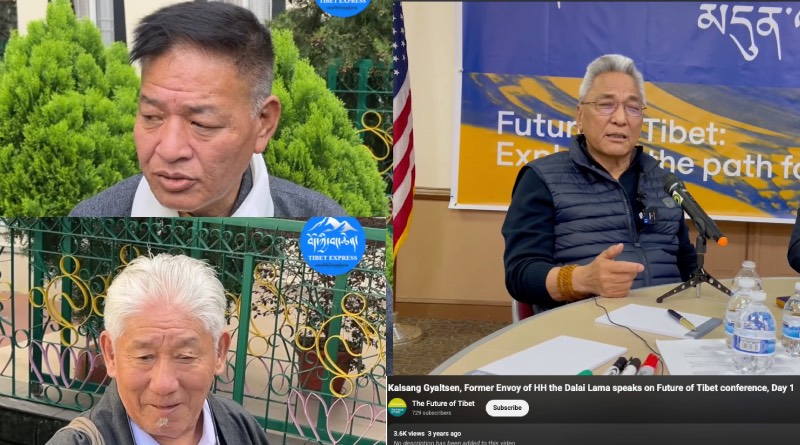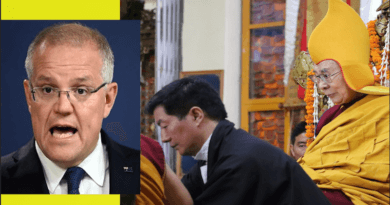Tibetan MP Questions Cabinet Over Policy Advisor’s 3-year-old Critique of Middle Way Approach
By Tenzin Chokyi

DHARAMSALA 13 Sept: What is the Cabinet’s view when a policy advisor to the Central Tibetan Administration(CTA) questions the very viability of the Middle Way policy? asked MP Dawa Tsering, as the Tibetan Parliament-in-Exile posed a starred question to the CTA President led Kashag(Cabinet) over remarks by Kelsang Gyaltsen, one of the two former envoys of His Holiness the Dalai Lama entrusted with the responsibility of conducting the dialogue with the Chinese leadership.
The remarks in question date back to three years, when Gyaltsen, who is an advisor to the Permanent Strategy Committee(PSC) of the CTA, told a conference on Tibet’s future- the Second edition of which was held in Paris, France, from November 25-27 – that there was “no hope for a meaningful resolution to the Tibetan cause with the current authoritarian Chinese government.”
He urged Tibetans to abandon such expectations and instead seek alternative strategies beyond the Middle Way policy in order to be prepared for potential changes in China.
MP Dawa Tsering pressed the Cabinet, asking whether the Kashag was aware of Gyaltsen’s views, if so, what is the Kashag’s stand over it. Whether Gyaltsen presented such views as an advisor to the committee and that does his remarks risk misleading the public about the CTA’s established policy, and how the administration should weigh such opinions from its own advisory body—views which, he admitted, did not sit well with him.
Responding to the questions, CTA President Penpa Tsering stated that in any democratic society, every individual, regardless of their position, has the right to speech and hold personal opinions. He clarified that Kelsang Gyaltsen is an advisor, not a member of thePSC, and that since the statement was made in his personal capacity, the Kashag is not obliged to respond to it.
“It is natural to have different perspectives within the advisory body; without them, the committee would serve no purpose. But decisions are taken by those in authority through a process,” the Sikyong said.
He added that the Cabinet would not terminate Gyaltsen’s position in response to questions over whether someone with divergent views on the Middle Way policy should continue to serve on the advisory body.
MP Serta Tsultrim contended that Gyaltsen’s assessment carried the weight of reality rather than being dismissed as mere opinion, given his long experience in dialogue with China. The Sikyong, while acknowledging Gyaltsen’s expertise, pushed back against elevating one individual’s view as definitive.
By stressing the importance of distinguishing opinion from fact and noting that other experts also bring valuable perspectives, he carefully steered away from accepting Gyaltsen’s words as conclusive.
Statements questioning the viability of the Middle Way approach, such as those made by Kelsang Gyaltsen, are not new. Similar concerns have been raised by leaders and activists who have directly engaged with Chinese counterparts in search of a peaceful resolution to the Tibetan issue. Nor is it new that views diverging from the Middle Way policy often become politicized, at times framed as being at odds with the Dalai Lama’s wishes or with the unity of the Tibetan community.
For the uninitiated, the Task Force on Sino-Tibetan negotiation was constituted in 1999 to recommend policy matters and strategies to find a peaceful and mutually acceptable negotiated resolution to the issue of Tibet.
Nine rounds of talks were held between the envoys of His Holiness the Dalai Lama and representatives of China’s United Front Work Department since 2002.
During the nine rounds of Sino-Tibetan talks, the Tibetan side had presented to the Chinese leadership a Memorandum and Note seeking genuine autonomy for Tibet as enshrined in the Chinese constitution and Law on Regional National Autonomy.
The ninth and the last round of talks was held in 2010 and in 2012, the envoys of His Holiness the Dalai Lama resigned from their positions citing overall deteriorating situation inside Tibet and “the lack of willingness and sincerity” from the Chinese side.
In 2021, Task Force on Sino-Tibetan negotiation was dissolved by the Cabinet led by Sikyong Penpa Tsering, and subsequently set up a strategic planning committee to replace it.






